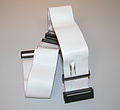A+ Certification/Exam Objectives/Hardware/Basics/Storage/Floppy disk drive
The Floppy Disk Drive (FDD) magnetically reads and writes information into floppy disks. Floppy disks are a form of removable storage. The FDD is mounted inside the computer unit and is only removed from the system for repairs or upgrades.
The standard size for modern day floppy disks is a 3 ½-inch disk with a hard plastic exterior shell that protects the thin, flexible disk inside. Standard Floppy Disks hold 1.44 MB of data, which is useful for simple files, such as Microsoft Word documents, but not very effective for graphical content. With the introduction of the USB Removable Drive, the Floppy Disk Drive has somewhat disappeared from newer computer systems.
Floppy disks
[edit | edit source]
The floppy disks are legacy storage mediums that contain a small amount of data. Despite the larger size, the 8-inch and 5.25-inch disks store less data than the 3.5-inch disk, due to less efficient manufacturing and design.
The disks themselves have three major components. The outer envelope provides protection against some external hazards, such as dust (although the older floppies are stored in an additional envelope.) On the inside of the envelope is a cloth to reduce turning friction, and is placed on both sides of the magnetic film used to store the data. The 3½-inch disk also has a sliding metal tab that provides some additional protection.
The notable components of the floppy disk are:
- The envelope, either a soft plastic for the larger disks, or a hard plastic shell for the 3½-inch floppy
- For the 3½-inch floppy, a metal shield.
- For some floppies, a hole or tab used to indicate write protection, disk density, etc.
- On the inside of the envelope, a sheet used to reduce friction for the spinning component.
- A flexible magnetic-coated film that contains data.
- A hub (for the 3½-inch floppy) or hole used to allow the magnetic-coated film to rotate in the drive.

Floppy disks are given an ability to protect against accidental write operations. With the 5¼-inch floppy, you can write to the disk by creating a notch on the upper-right corner, aligned with the bottom of the label. With a 3½-inch floppy, there is a slidable tab on the back of the disk.
Floppy drives
[edit | edit source]The floppy drives are used to read the floppy disks.
When installing a floppy drive, it is connected using a floppy drive cable, and a 4-pin berg or molex connector (depending on the drive). An external drive uses its own connection (e.g. USB).
In MS-Dos (and related operating systems), the drive letter assigned to the drive depends on the physical connection selected on the FDD cable. If it is connected to the end of the cable, it is drive A. If it is connected to the middle, it is drive B. Up to two devices may be connected. While some FDD connectors may include a pair of connectors at the end and at the middle, only one connector in the pair may be used to operate a drive.
-
5¼-inch drive
-
3½-inch drive
-
Floppy disk drive cable, supporting ether a 5¼ or 3½ connection



